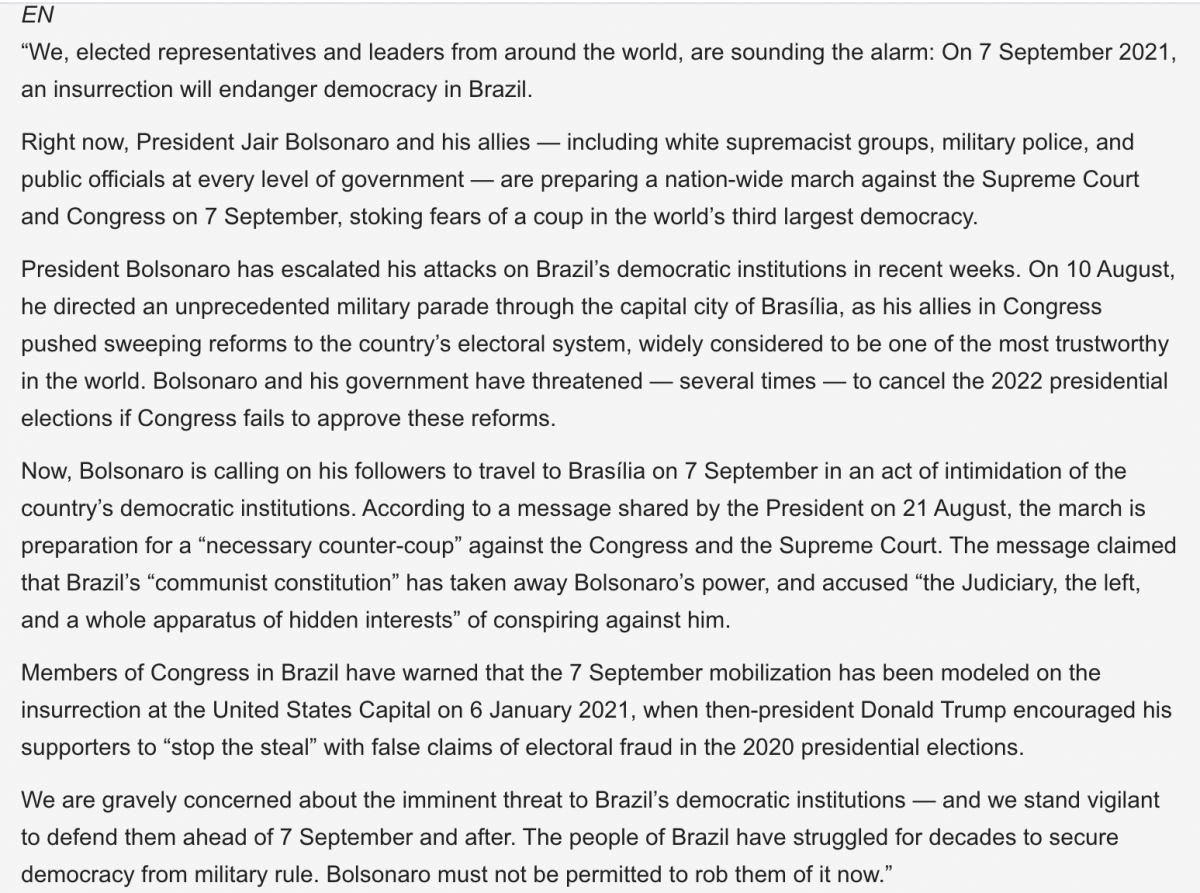Last weekend, I erroneously wished my Brazilian friend a "Happy Independence Day" for Tuesday and a peaceful bank holiday. Like many of us who examine Brazil from the outside, I imagined that 7th September, known as Brazil's Independence Day, would attract a constellation of brightly-coloured carnival costumes, funk music, and some refreshing caipirinhas. Indeed, we outsiders often perceive that Brazil is an easy-going, bare-foot-beach-walking, barbeque-eating, samba-dancing nation. It seems only right that Brazil's National Day must be a day for celebrating the rhythmic pulse of this tropical paradise. So, you can imagine how surprised I was when my friend told me that the lead-up to Independence Day was plagued by warnings of yet more violence in Brazil.
Unfortunately, the rumours were true. Ironically, Independence Day has not been a day for celebrating the unity of the Brazilian nation. Instead, today's events have highlighted the polarisation of Brazil's highly diverse and unequal society. It is not unknown for violent clashes to break out during Independence Day in Brazil. In 2013, anti-corruption and anti-government protesters threw rocks at the military paraders and grappled with the riot police. During this infamous 'protest year', millions of Brazilians opposed the excessive expenditure of President Dilma Rousseff's government on high-profile events- such as the Olympic Games and the World Cup- during a period of rising unemployment and social services cuts. The difference is that this year's Independence Day extravaganza was incited and forewarned by the current far-right President Jair Bolsonaro.
Bolsonaro's popularity has plummeted to an all-time low since the beginning of his presidency in January 2019. The retired military officer and President lost considerable support due to his reckless and delayed response to the Covid-19 pandemic. During the initial stages of the Covid-19 outbreak, Bolsonaro overtly spread misinformation about the use of masks and vaccines, claiming that Covid-19 was 'just a flu'. After finally agreeing to vaccinate Brazil's enormous population, Bolsonaro was accused of turning a blind eye to corruption in his government concerning the purchase of vaccines. Today's 580,000 Covid deaths, coupled with rising unemployment rates and prices, has caused public distrust and discontent to spread in Brazil.

President Bolsonaro therefore knows that now is a crucial moment to restore his public image, given that the Brazilian general election lies just around the corner in October 2022. In the run up to Independence Day, Bolsonaro decided to adopt a gas-lighting strategy. He stated that a 'countercoup' would be necessary to shut down the Supreme Court and the Congress, claiming that Brazil's 'Communist constitution' had stolen his power and turned the judiciary against him. On Saturday, Bolsonaro alerted Brazilians that a political 'rupture' was imminent and it is reported that Bolsonararistas were calling for a self-coup before the Presidential address.
This morning, many Brazilians like my friend were therefore waking up on their Bank Holiday filled with a sense of dread and fear. Indeed, an encampment of 1,000 indigenous protestors, situated just miles away from the pro-Bolsonaro groups, were warned not to go out yesterday evening. On 7th September, before the break of dawn, Bolsonaro supporters, including white supremist groups, the military police, and public officials, had already confronted state police officers. Inspired by the Trump supporters' Capitol insurrection, the Bolsonaristas tried to force their way through the blockade and head towards the Congress in lorries adorned with red and yellow Brazilian flags (now a pro-Bolsonaro symbol). Protesters threatened to storm the Supreme Court, before widespread pro-government rallies proceeded to take place. A second gathering had already been planned in São Paulo for the afternoon, as well as protests across the country in smaller towns and cities.
For most countries, the military parades on Independence Day evoke sentiments of national pride as the country remembers how it defended its sovereignty from foreign enemies. Not in Brazil. Many Brazilians and Brazilianists argue that Brazil's perceived enemy is internal, rather than external. Today's military parades therefore did not bring about national unity. Instead, they triggered the manifestation of Brazil's deep-seated culture war. As pro-Bolsonaro forces flocked the streets they were met by Bolsonaro's growing opponents. Today, anti-Bolsonaro protesters reinacted Brazil's tradition of the 'Grito dos Excluídos o das Excluídas' ('The Cry of the Excluded') to denounce Brazil's social problems. The Campanha Nacional Fora Bolsonaro (the national campaign against Bolsonaro) has been organising widespread protests calling for the President's impeachment in Brazil and across the diaspora since May this year.
However, Independence Day marks a crucial political moment for several reasons. For some Brazilians, the day leads them to remember Brazil's long plight for sovereignty and democracy, after centuries of colonialism and slavery and the brutal dictatorship from 1964 to 1985. For the international community, it's a blatant wake-up call that the world's third-largest democracy, and Latin America's largest democracy, is under threat. Bolsonaro continues to unapologetically praise the former torturers of Brazil's dictatorship and undermine the credibility of Brazil's democratic institutions which took so long to build. Twenty five years after the end of the dictatorship, could Brazil's democracy be on the brink of collapse again?



















